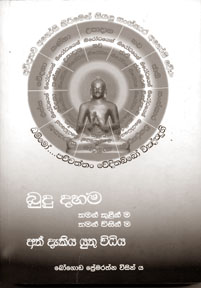Books
How not to get lost
On the path to enlightenment
Title: Budu dahama thaman thulin thaman visinma ath dakiya yuthu
vidiya
Author: Bogoda Premaratne
Publishing rights: Aruna Perera
Pages: 560
Price: Rs. 350/-
by Aditha Dissanayake
 Can one find a difference between "Buddha Dhamma" and the Teachings
of the Buddha? Isn't one a synonym for the other? Yet, this is what
Bogoda Premaratne says in the introductory brochure to his book Budu
Dahama Thaman Thulin Thaman Visinma Ath Dakiya Yuthu Vidiya" (How
Buddhism could be learnt through one's inner self on one's own). "It is
essential that we recognize the distinction between the Buddha Dhamma,
the Teaching of the Buddha, and Buddhism...". Can one find a difference between "Buddha Dhamma" and the Teachings
of the Buddha? Isn't one a synonym for the other? Yet, this is what
Bogoda Premaratne says in the introductory brochure to his book Budu
Dahama Thaman Thulin Thaman Visinma Ath Dakiya Yuthu Vidiya" (How
Buddhism could be learnt through one's inner self on one's own). "It is
essential that we recognize the distinction between the Buddha Dhamma,
the Teaching of the Buddha, and Buddhism...".
In questioning the author, I believe what I am applying here is the
Kalama Sutra which says "Rely not on the teacher/person but on the
teaching. Rely not on the teaching but on the spirit of the words. Rely
not on the theory but on experience. Do not believe in anything because
it is spoken and rumoured..."
Perhaps this is a ploy of the author to jolt the reader out of
semi-slumber into a state of alertness. For, before one reaches the
first five pages of the book one is subjected to a long list of
questions. "What comes to mind when you hear the word "nature"? Do you
think of trees, oceans, animals or do you think of the organs within
your own body? Have you ever wondered how nature came into being?".
I believe the author adopts this style because he sees this as the
most effective way he can bond with the reader - through dialogues
because during the time of the Buddha too, everything, even the deepest
doctrines were taught through speech - "no one took down notes, no one
read them later, everyone listened with great attention, everyone stored
what they heard in their mind. But today, things have changed, no one
pays attention to what they hear or read" laments the author.
Thus he writes in colloquial language explaining lucidly such deep
concepts as the meaning of Athma (p.237) or the concept of "Samadhi"
giving a pragmatic perceptive at times using cricket matches and TV
programmes.
A TV programme for example, is a deception of the eyes and the ears;
so too most things in our lives. In order to learn what is going on one
must come to grips with "Paticca Samuppada".
This concept is explained, once again, through a series of questions,
beginning with what is Sanskara? What is Vigyana etc. Describing the
difference between vidya and avidya the author writes knowledge as we
know it i.e "We know that person", "I know how to speak English", " I
know science" - is not the same as "knowledge" found in Buddhism. In
Buddhism the best term that can describe the opposite of avidya is
"experience" which is the combination of wisdom and insight.
The book is a comprehensive survey which shows the readers how to
make Buddhism a part of their lives. Written in an easy going style, yet
filled with information here is a wonderful resource which will keep
everyone on the right path who are on their way to achieving
enlightenment.
But the final words come from the opening paragraph of the
introduction given by the author "if you think you can read this book in
one breath, or in a day or two and then forget about it, sorry this is
not for you..."
[email protected]
Directory of Buddhist temples
The Sanasili Foundation has compiled and published the second edition
of Viharasthana Durakathana Namavaliya, a directory of the Buddhist
temples located in the Colombo District. The first edition was created
by Parliamentarian Milinda Moragoda in 2002.
The latest edition of the directory includes the names of the chief
incumbents of each temple, telephone numbers and addresses. New temples
set up since 2002 have also been added to the 2006 edition.
Complimentary copies are being distributed to every temple in the
district. A limited number of complimentary copies can be obtained from
the Sanasili Foundation Office (Tel. 4520635/2595901)
After thirty years
The London Buddhist Vihara, Bedford Park, London, hosted the launch
of Ananda Noel Mendis' maiden book titled Avurudu Thihakata Pasu (After
thirty years) on December 2, 2006. The book distributed by Dayawansa
Jayakody & Co. contains ten short stories and ten poems.
Thirty years after leaving his motherland, the author recollects and
interprets in short story form, some childhood memories about where he
grew up.
The sharp, witty style of writing holds the reader enthralled, from
start to finish. |



 Can one find a difference between "Buddha Dhamma" and the Teachings
of the Buddha? Isn't one a synonym for the other? Yet, this is what
Bogoda Premaratne says in the introductory brochure to his book Budu
Dahama Thaman Thulin Thaman Visinma Ath Dakiya Yuthu Vidiya" (How
Buddhism could be learnt through one's inner self on one's own). "It is
essential that we recognize the distinction between the Buddha Dhamma,
the Teaching of the Buddha, and Buddhism...".
Can one find a difference between "Buddha Dhamma" and the Teachings
of the Buddha? Isn't one a synonym for the other? Yet, this is what
Bogoda Premaratne says in the introductory brochure to his book Budu
Dahama Thaman Thulin Thaman Visinma Ath Dakiya Yuthu Vidiya" (How
Buddhism could be learnt through one's inner self on one's own). "It is
essential that we recognize the distinction between the Buddha Dhamma,
the Teaching of the Buddha, and Buddhism...". 







